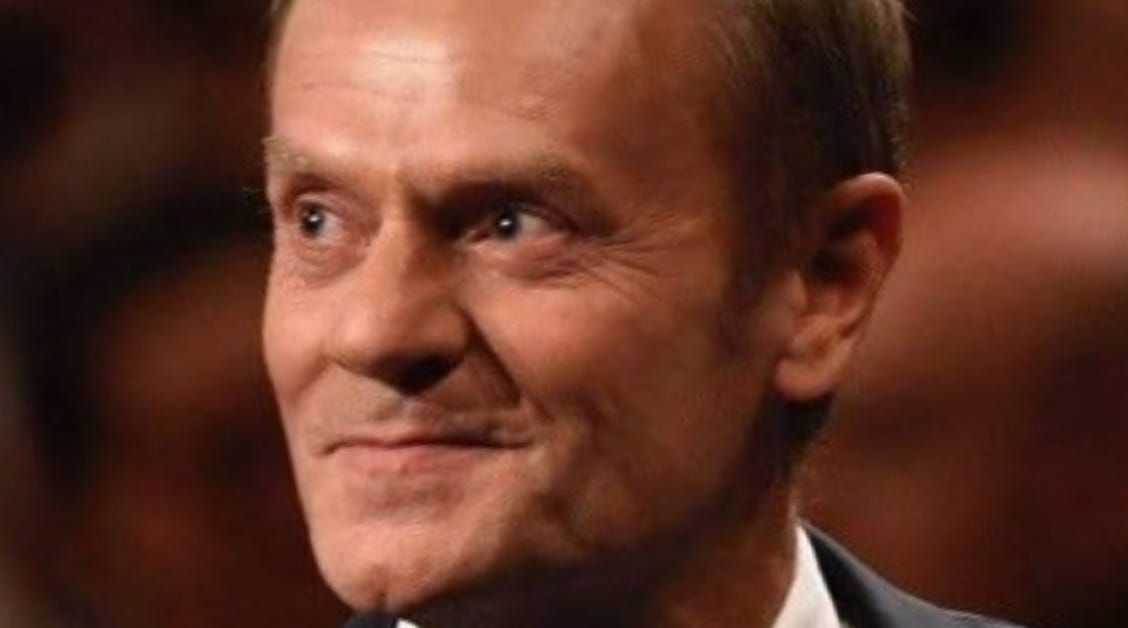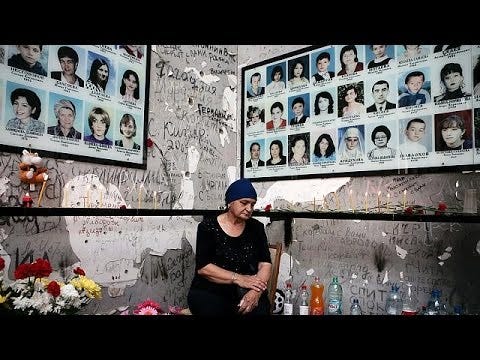Putin’s 334 Dead Beslan Hostages: How He Mishandled the Crisis and Exploited the Atrocity to Cement a 28 Year Autocracy
Vladimir Putin’s Brutal Handling of the 2004 Hostage Crisis and 300+ Deaths Fostered a Rigid Regime Too Proud to Heed Western Warnings
On this day twenty years ago, more than 1,100 people including teachers, parents, and children sat couped up in a gymnasium, fearing for their lives while 32 armed men stood watch.
One day later it would be over—but for some more than others as along with the 31 Chechen rebels, 186 children and 148 adults would perish.
Following the bloodshed, experts speculated that the entire drama from its concept and the reason for its existence (disgruntled Chechen and Ingush rebels), to the Russian government's disastrous handling of it, showed a weakness in Vladimir Putin’s rule.
Putin was determined to telegraph and manifest the opposite, and in the years that followed a remarkable rallying of strength was noted in the Kremlin—not around the Duma or Russian Government, but around Putin himself.
His fervor was telegraphed by the cancellation of democratic processes and a speech made immediately after the Beslan massacre, where he suggested Western involvement and implied that external forces were attempting to destabilize Russia.
In an interview with PBS, Vladimir Ryzkhov, a former Russian politician and opposition member, claimed that life in Russia became more “rigid” after the Beslan siege.
A report by Human Rights Watch mirrored these claims saying:
“He subsequently pushed through a package of political changes that have taken his already overwhelming dominance of Russian politics to a new level.”
“President Putin now essentially appoints regional governors, rules for parliamentary elections have been changed in a way that is likely to further reduce opposition in parliament, and proposals that would give the executive branch more control over the judiciary are currently being considered by the State Duma,” the paper noted.
Notably, the handling of the hostage crisis was a lesson for any group entertaining the idea of terrorism in Russia and kept the country incident-free—until the Crocus Hall Massacre on March 22, 2024, that is.
The Crocus Hall Massacre
Following the attack on would-be concertgoers at Moscow’s Crocus Hall, the death toll was reported to have reached 145 people, while another 551 were injured.
At the time, the country's national investigative committee indicated that more than eleven people were apprehended in connection with the incident, which is over and above four of the five actual triggermen who were initially reported to have escaped.
Conflicting reports on how many of the actual attackers were arrested (some said four) and how many of them were killed (some said two) emerged.
When Vladimir Putin addressed the incident he avoided mentioning ISIS's claim of responsibility altogether, instead opting to implicate Ukraine:
“They (the attackers) tried to hide and moved towards Ukraine, where, according to preliminary data, a window was prepared for them from the Ukrainian side to cross the state border,” Russian state media organization, RIA Novosti, quoted him saying.
Ukraine hit back denying any involvement but cited a “long history of bloody provocations” by Russia among its people.
“We consider such accusations to be a planned provocation by the Kremlin with the aim of further fueling anti-Ukrainian hysteria in Russian society,” Ukraine’s spy agency wrote in a Telegram update.
It further claimed that the attack created “conditions for increased mobilization of Russian citizens to participate in criminal aggression against our state and discrediting Ukraine in the eyes of the international community.”
This sentiment was mirrored by the Polish Prime Minister, Donald Tusk, who was one among many world leaders to offer condolences. He also voiced fears that the incident would provide a pretext for Russia to ratchet up hostilities against the West.
“We hope that this terrible tragedy will not become a pretext for anyone to escalate violence and aggression,” he wrote in a statement on X.

The incident did not come as a surprise to everyone.
According to a BBC report, an unnamed U.S. government official claimed that the Joe Biden administration had warned Russian authorities “in accordance with its long-standing duty” about an imminent terrorist attack on its soil.
The US embassy in Russia also issued an advisory to Americans living in the country on March 7, in which it said:
“The Embassy is monitoring reports that extremists have imminent plans to target large gatherings in Moscow, to include concerts, and U.S. citizens should be advised to avoid large gatherings over the next 48 hours.”

Twelve days after the warning, RIA quoted Putin citing “recent provocative statements of a number of official Western structures about the possibility of terrorist attacks in Russia” as “outright blackmail and an intention to intimidate and destabilize our society.”









